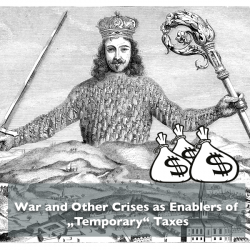The Twentieth Century revealed that countries with similar economic development like South Africa and Brazil have significant differences in taxing personal income ranging from 4% in Brazil to almost 16% (% GDP) in South Africa by the end of the century. In his predominant cross-country comparison Evan S. Liebermann argued that the National Political Community was ultimately responsible for the differences in the development of income policies. Within the three volumes of Podcast’s I will elaborate and discuss the National Political Communities and Income Taxation in both countries in the twenty first century and provide meaningful insights from Tax specialist.
Category: Direct Taxation
Tax affiliation of multinationals in view of the permanent establishment definition

International profit shifting allows multinationals to save immense amounts of taxes. However, there are many stakeholders involved in international tax competition. For instance, developing countries suffer from tax shifting strategies, while multinationals benefit by shifting profits to tax havens. In determining the taxes, the permanent establishment plays a key role. The OECD’s Base Erosion and Profit Shifting (BEPS) Action 7 is an approach to prevent the avoidance of permanent establishment status. In this podcast, I will do a holistic analysis of this topic.
Automated Payment Transaction Tax (Micro Taxing)

A Micro Tax or an Automated Transaction Payment Tax is a radical change going from a larger and more complicated tax system to a system with a single comprehensive revenue neutral Automated tax, replacing the present system of personal and corporate income taxing. In this podcast, we aim to look at what it is, similar taxes that have already been introduced, political movements and the pros/cons of introducing this tax.
Wars and Other Crises as Enablers of “Temporary” Taxation

The history of tax is also one of conflict, danger and upheaval.The purpose of the state has always been to protect the population from internal and external dangers. And that is from where it derives its legitimacy. Now it is in the nature of things that wars and other crises devour enormous financial resources that have to be borne by the general public. In such moments, rulers often get creative and temporarily introduce new measures to meet the costs arising from war or the fight against epidemics. In many cases, however, these new forms of taxation remain in place and are not, after all, of such a provisional nature as once claimed. In this piece, I will discuss the longevity of provisional taxation and use the Swiss direct federal tax, which has its origins in the military tax of the First World War, as an illustration.
The “Heiratsstrafe” in Switzerland and it’s role in the Swiss women’s struggle for equality

In 1984, the Swiss Federal Court ruled that the marriage penalty, i.e. taxing married couples higher than unmarried ones, as unconstitutional. 37 years later, the penalty still exists, with over 700,000 couples in Switzerland affected. This has had serious implications for women’s labor market participation. While various alternatives to joint taxation are being discussed, individual taxation would not only eliminate any marriage penalties and bonuses, it would also incentivize female labor market participation most. If accompagnied by further policies such as affordable childcare and parental leave, individual taxation could play a significant role in the women’s struggle for equality.
Taxing the rich: Assessment of the French Solidarity Wealth tax from a political economy perspective

In 2017, President Emmanuel Macron repealed the French Solidarity Wealth tax (in French: Impôt de solidarité sur la fortune or ISF), in order to support investment, employment, innovation and economic growth in France. The ISF had to be paid by individuals whose estate exceeded the taxation threshold which was set at 1 300 000 EUR. This decision triggered a strong discontent among the lower-middle class, which has been captured by the yellow vests movement. The public pushback against the suppression of this specific tax may be very surprising as the economic consequences of the ISF were very disappointing. The deep nature of the dissatisfaction was eminently symbolic, as this wealth tax has been raised as a political symbol of the left-right ideological divide on taxation. President Emmanuel Macron chose to honor the individual freedom to enrich oneself and refused to reintroduce the ISF. By doing so, he confirmed the image of being a « President of the rich ». This determination in pursuing important fiscal reforms while ignoring popular opposition will certainly have political consequences, which will be assessable during next presidential elections that take place in April 2022.
The Window Tax – indirect taxes, tax avoidance, and architecture

Many homes with bricked up windows represent integral icons in British towns and cities. Why so? In this podcast, we dive back into history to discover the Window Tax, that was in effect for more than 150 years up until 1851. We shall explore why such a tax came about; what its intended and unintended consequences were, and what role it had in revenue collection for the Crown, alongside other indirect taxes. Finally, we shall take a look at how tax avoidance behavior has left a permanent and observable mark on architecture across the world. This is a story of incredible ingenuity on the part of Englishmen in asserting their liberties against parliament by exploiting loopholes in legislation to free themselves from the burdens of taxation.
Recent Comments